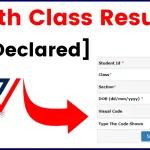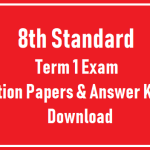Learning for the 8th-grade 3rd-term English exam becomes easier with a comprehensive collection of questions and answers. This set covers grammar, reading, writing, and literature to prepare students for their academic goals. Designed for clear understanding, it helps in building confidence and mastering essential language skills for the term-end examination.
Grammar Questions
Question: What is a noun?
Answer: A noun is a word that names a person, place, thing, or idea.
Question: Write an example of a proper noun.
Answer: “London” is an example of a proper noun.
Question: What is the past tense of ‘run’?
Answer: The past tense of ‘run’ is ‘ran’.
Question: Define a pronoun with an example.
Answer: A pronoun is a word that replaces a noun, like “he” or “she”.
Question: Give an example of a sentence using a conjunction.
Answer: I wanted to go, but it was raining heavily.
Question: What is an adjective?
Answer: An adjective describes a noun, like “beautiful” in “a beautiful garden”.
Question: What are articles in English?
Answer: Articles are “a”, “an”, and “the” used to modify nouns.
Question: Write a sentence with a preposition.
Answer: The cat is under the table.
Question: What is a verb?
Answer: A verb is an action word, such as “run” or “write”.
Question: What is an adverb?
Answer: An adverb describes how an action is done, like “quickly” in “he runs quickly”.
Question: What is a synonym for ‘happy’?
Answer: A synonym for ‘happy’ is ‘joyful’.
Question: Give an example of a sentence in the future tense.
Answer: She will visit her grandparents tomorrow.
Question: What is a compound sentence?
Answer: A compound sentence contains two independent clauses joined by a conjunction.
Question: Write an example of a question tag.
Answer: You’re coming to the party, aren’t you?
Question: What is the difference between ‘its’ and ‘it’s’?
Answer: “Its” shows possession; “it’s” means “it is” or “it has”.
Question: What is an imperative sentence?
Answer: An imperative sentence gives a command, like “Close the door.”
Question: What is direct speech?
Answer: Direct speech uses the speaker’s exact words, like “He said, ‘I am tired.'”.
Question: What is the plural of ‘child’?
Answer: The plural of ‘child’ is ‘children’.
Question: Write an example of a sentence with an interjection.
Answer: Wow! That’s an amazing view.
Question: What is the antonym of ‘cold’?
Answer: The antonym of ‘cold’ is ‘hot’.
Reading Comprehension Questions
Question: What is the main theme of a comprehension passage?
Answer: The main theme is the central idea or message of the passage.
Question: How do you find the meaning of an unfamiliar word in a passage?
Answer: You can find the meaning using context clues or a dictionary.
Question: What does the word ‘tranquil’ mean in the sentence: “The lake was tranquil”?
Answer: The word ‘tranquil’ means peaceful or calm.
Question: How can you identify the tone of a passage?
Answer: The tone is identified by the author’s choice of words and style.
Question: What is the purpose of a summary?
Answer: A summary condenses the main points of a text into a brief overview.
Question: What is a fact in a passage?
Answer: A fact is a statement that can be proven true.
Question: What is an opinion in a passage?
Answer: An opinion is a personal belief or judgment that cannot be proven.
Question: What are supporting details in a passage?
Answer: Supporting details provide evidence and explanations for the main idea.
Question: How do you identify the author’s purpose in a passage?
Answer: The author’s purpose may be to inform, persuade, entertain, or explain.
Question: What is an inference in reading?
Answer: An inference is a logical guess based on evidence in the text.
Question: Why is the title important in a passage?
Answer: The title gives a hint about the main idea of the text.
Question: How can you improve reading comprehension?
Answer: Practice active reading, take notes, and summarize key points.
Question: What is a narrative passage?
Answer: A narrative passage tells a story or describes an event.
Question: What is an expository passage?
Answer: An expository passage provides facts and information.
Question: What is a persuasive passage?
Answer: A persuasive passage aims to convince the reader of a viewpoint.
Question: How can visual aids help in understanding a passage?
Answer: Visual aids like charts or images clarify and support the text.
Question: What is the significance of the first paragraph in a passage?
Answer: The first paragraph introduces the topic and sets the tone.
Question: How do rhetorical questions help in a passage?
Answer: Rhetorical questions engage the reader and emphasize a point.
Question: Why is it important to understand the audience of a passage?
Answer: Knowing the audience helps understand the language and purpose of the text.
Mastering 8th-grade English for the third-term examination is a journey of learning grammar rules, improving comprehension, and refining writing skills. With this structured set of questions and answers, students are better equipped to tackle every aspect of their syllabus confidently and perform well in their exams.
Latest Posts
- Step-by-step guide to download and apply for jee mains admit card 202
- Comprehensive 2025 government holidays and recruitment details for job seekers
- JEE Mains Admit Card 2025: Your Step-by-Step Guide to Downloading the Hall Ticket
- Everything You Need to Know About 2025 Government Holidays Recruitment
- Comprehensive Guide to rrb d group recruitment 2025 – Eligibility, Vacancies, and Application
- Detailed guide to nps trust recruitment 2025 vacancies, eligibility and apply process
- Comprehensive guide to hpcl recruitment 2025 notification, vacancies, and application process
- ignou bed admission 2025 complete recruitment guide with eligibility and process
- Comprehensive Guide to Indian Army Agniveer Recruitment 2025 Notification and Jobs
- Everything You Must Know About CBSE Board Exams 2025 Changes & New Rules




